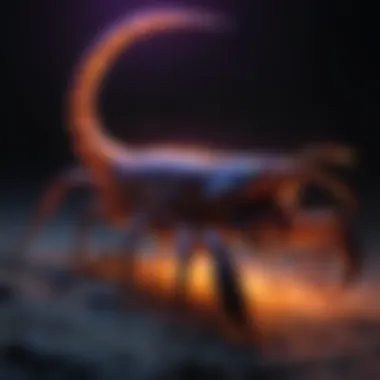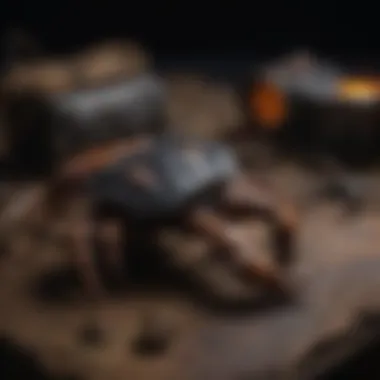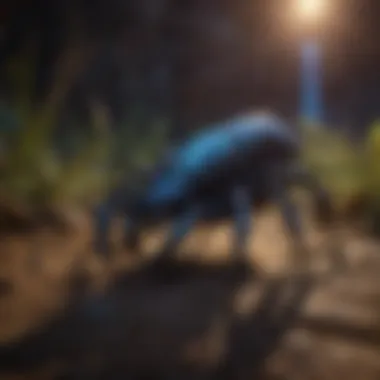Unveiling the Enigmatic World of Blacklight Scorpion Hunting


Rock and Fossil Identification
Embark on a fascinating journey into the realm of blacklight scorpion hunting, where the mysteries of nature are illuminated in the darkness. Understanding the types of rocks that scorpions inhabit and the fossils within their habitats is crucial. Look for specific characteristics such as crevices or underground caves where they may dwell. Equip yourself with essential tools like UV lights to assist in the identification of scorpions.
Collecting Tips and Techniques
Dive into the best practices for successful blacklight scorpion hunting. Locate prime hunting sites by researching scorpion habitats such as deserts or dry areas. Safely extract scorpions using specialized tools and gentle techniques to avoid harm to both yourself and the scorpion population. Remember to respect the environment and tread lightly during your collecting expeditions.
Preservation and Display
Preserving scorpions found during your nocturnal adventures is essential for studying and appreciating these creatures. Preserve them using ethyl alcohol or specialized preservation kits, ensuring they remain intact for future observation. Store specimens in airtight containers or shadow boxes to prevent decay. Get creative with display ideas, showcasing your finds in a visually engaging manner to share the wonders of blacklight scorpion hunting.
Geological Insights
Gain deeper insights into the geological aspects of the scorpion's habitat. Understand the formations and processes that create suitable environments for scorpions to thrive. Explore the historical significance of scorpions in the natural world, including their adaptations and survival mechanisms. Learn about notable discoveries related to blacklight scorpion hunting, showcasing the ongoing scientific exploration of these elusive creatures.
Introduction to Blacklight Scorpion Hunting
Embark on an exhilarating journey into the intriguing realm of blacklight scorpion hunting. This section serves as the gateway to a captivating adventure where you uncover the mysteries hidden within the nocturnal world of scorpions. Understanding the importance of this topic is crucial, as it lays the foundation for the subsequent exploration of techniques, equipment, and safety measures essential for a successful and unforgettable experience in the mystical hunt for these enigmatic creatures. By delving into the specifics of blacklight scorpion hunting from the outset, readers are primed for a thorough understanding of the intricacies involved in this fascinating activity.
Understanding Scorpions and Their Habitat
Ecology of Scorpions
Exploring the intricate ecology of scorpions sheds light on their behavior, lifecycle, and interactions within their environment. This examination is pivotal in deciphering the nuances of scorpion biology and ecology, enabling enthusiasts to appreciate the unique adaptations that have allowed scorpions to thrive for millions of years. Delving deep into the ecological aspects not only enriches our knowledge but also provides insights into the evolutionary marvels of these nocturnal arachnids.
Adaptations to Nocturnal Life
Delve into the realm of scorpion adaptations to nocturnal life, where these creatures have evolved unique physiological and behavioral traits to conquer the darkness. Understanding how scorpions navigate the night unveils a world of sensory mastery and survival strategies honed through centuries of evolution. These adaptations not only showcase the resilience of scorpions but also offer a glimpse into the intricate tapestry of nature's creations.
Preferred Environments
Unravel the secrets of scorpion habitats, exploring the diverse landscapes where these fascinating creatures thrive. From desolate deserts to lush forests, scorpions inhabit a variety of environments, each with its unique challenges and opportunities for observation. Studying their preferred ecosystems provides crucial insights into locating scorpions during the hunt, ensuring a fruitful and enriching experience for enthusiasts of all levels.


Role of Blacklight in Scorpion Hunting
How Blacklight Affects Scorpions
Discover the profound impact of blacklight on scorpions, unraveling how these creatures react to ultraviolet light stimuli. Blacklight plays a pivotal role in illuminating scorpions in the darkness, unveiling their presence with mesmerizing fluorescence. Understanding this interaction between scorpions and blacklight is essential for successful hunting expeditions, enhancing visibility and facilitating the observation of these elusive creatures with unparalleled clarity.
Benefits of Using Blacklight
Explore the myriad benefits of incorporating blacklight into scorpion hunting endeavors, ranging from increased detectability of scorpions to enhancing the overall experience of nocturnal expeditions. The use of blacklight not only magnifies the thrill of the hunt but also offers enthusiasts a unique perspective on scorpion behavior and ecology. By harnessing the power of blacklight, enthusiasts can delve deeper into the nocturnal world of scorpions, unlocking hidden secrets under the glow of ultraviolet illumination.
Types of Blacklights
Navigate the diverse landscape of blacklights, dissecting the various types and functionalities that cater to different hunting preferences and environments. From handheld UV flashlights to specialized blacklight devices, the market offers a range of options for avid scorpion hunters. Understanding the nuances of each blacklight variant is crucial in selecting the most suitable tool for illuminating scorpions effectively, maximizing the success of nocturnal excursions.
Safety Precautions and Guidelines
Protective Gear
Prioritize safety in every scorpion hunting venture by donning appropriate protective gear that shields enthusiasts from potential risks and hazards. From sturdy gloves to protective clothing, investing in high-quality gear enhances safety protocols during expeditions. By emphasizing the importance of protective equipment, this section underscores the necessity of safeguarding oneself while immersing in the exhilarating pursuit of blacklight scorpion hunting.
Scorpion Handling Tips
Master the art of handling scorpions with precision and care, learning essential tips and techniques to interact safely with these intriguing arachnids. Proximity to scorpions demands caution and expertise, making it imperative to follow guidelines that minimize risks and ensure a harmonious coexistence during encounters. By adhering to best practices in scorpion handling, enthusiasts can deepen their understanding of these creatures while fostering mutual respect in their interactions.
First Aid Measures
Prepare for unforeseen circumstances by familiarizing yourself with effective first aid measures tailored to scorpion-related incidents. From minor stings to potential emergencies, having a comprehensive understanding of first aid protocols equips enthusiasts to respond promptly and efficiently in varying situations. By prioritizing first aid preparedness, this section underscores the importance of safety consciousness in every aspect of blacklight scorpion hunting adventures.
Preparing for the Hunt
In the realm of blacklight scorpion hunting, meticulous preparation is paramount to an engaging and successful excursion. As we embark on this nocturnal adventure to unveil the mysteries of these elusive creatures, the section on preparing for the hunt serves as a crucial foundation for a fulfilling experience. Understanding the significance of thorough preparation sets the stage for a seamless and immersive journey into the world of blacklight scorpion hunting.
Essential Equipment for Blacklight Scorpion Hunting
UV Flashlights


Delving into the specifics of essential equipment for blacklight scorpion hunting, UV flashlights take center stage as a pivotal tool in illuminating the nocturnal activities of scorpions. The unique feature of UV flashlights lies in their ability to reveal fluorescent properties in scorpions, making them standout in the darkness. This characteristic proves beneficial in spotting scorpions against the night landscape, enhancing the overall hunt experience. Despite their advantages in pinpointing scorpion presence, UV flashlights may have limitations in terms of battery life and intensity. Nevertheless, their significance in this article cannot be overstated due to their crucial role in detecting scorpions.
Containers for Capturing Scorpions
Transitioning to containers for capturing scorpions, these essential tools play a vital role in safely securing scorpions for observation and study. The key characteristic of these containers lies in their design, which allows for easy capture and transport of scorpions without harm. This feature makes them a popular choice among blacklight scorpion hunters seeking to study these creatures up close. While containers offer convenience in handling scorpions, their disadvantages may include limited ventilation and space for larger specimens. Therefore, utilizing containers effectively requires careful consideration of scorpion size and behavior.
Field Guide for Identification
Moving on to the field guide for identification, this resource serves as a valuable companion for hunters looking to distinguish between different scorpion species. The key characteristic of field guides is their comprehensive information on scorpion morphology, behavior, and habitat preferences, aiding hunters in proper identification. Their unique feature lies in providing detailed illustrations and descriptions, enhancing the accuracy of species identification. Despite their advantages in species recognition, field guides may have limitations in covering all possible scorpion variations. Nevertheless, their contribution to this article is invaluable in guiding hunters towards a deeper understanding of scorpions.
Thriving in the Hunt
Embarking deeper into the fascinating realm of blacklight scorpion hunting, the section on "Thriving in the Hunt" within this meticulously crafted article serves as a pivotal component driving the narrative forward. This section accentuates the significance of honing one's skills and techniques to not only spot scorpions with precision but also to foster a deeper connection with these nocturnal creatures. By delving into specific elements such as behavioral cues, distinctive signs of their presence, and the essential patience and observational skills required, readers are equipped with a holistic understanding of the art of thriving during a scorpion hunt.
Techniques for Spotting Scorpions
In the nocturnal pursuit of scorpions, mastering the art of spotting these elusive creatures is a skill that separates novice from seasoned hunters. Scorpion Behavior Cues unveil a world of insights into the behavioral patterns and movements of scorpions, providing enthusiasts with invaluable cues for successful spotting. Understanding these cues enhances the hunt experience, allowing for more efficient tracking and interaction with the creatures. Furthermore, Distinctive Signs of Presence offer subtle yet crucial indicators of scorpion habitation, aiding hunters in narrowing down their search areas and increasing the likelihood of a fruitful encounter. Patience and observational skills play a pivotal role in successful scorpion hunting ventures. The ability to remain calm, observant, and attuned to the surroundings enables hunters to uncover hidden scorpions, adding a layer of thrill to the expedition.
Scorpion Identification and Classification
Diving deeper into the world of scorpions, the section on Scorpion Identification and Classification sheds light on the diverse species that enthusiasts may encounter. Understanding Common Scorpion Species is paramount, as it provides crucial knowledge for identifying and categorizing scorpions based on physical attributes and habitat preferences. By recognizing distinguishing features unique to each species, hunters can enhance their proficiency in classification, enriching their overall hunting experience. Moreover, Recording Findings serves as a valuable component in documenting scorpion encounters, facilitating research efforts and contributing to the collective knowledge base about these fascinating creatures.
Documenting the Experience
As the nocturnal adventure unfolds, enthusiasts are encouraged to document their discoveries and insights through various means. Photography Tips offer guidance on capturing the essence of scorpion encounters, enabling hunters to immortalize their experiences through visual storytelling. Journaling Discoveries provides an avenue for introspection and personal reflection, allowing enthusiasts to chronicle their learnings and emotions encountered during the hunt. Lastly, Sharing Insights fosters a sense of community among scorpion hunters, offering a platform to exchange knowledge, experiences, and conservation efforts, contributing to the collective passion for preserving these captivating creatures and their habitats.
Preservation and Conservation
In the realm of blacklight scorpion hunting, Preservation and Conservation play a vital role in ensuring the sustainability and protection of these fascinating creatures and their habitats. Conservation efforts are crucial for maintaining ecological balance and preserving scorpion populations for future generations. By focusing on the ethical and responsible practices of preservation and conservation, enthusiasts can contribute to the long-term health of scorpion populations and their ecosystems. Embracing these principles enhances the overall hunting experience and fosters a deeper appreciation for the intricate relationships within nature.
Ethical Considerations in Scorpion Hunting
Rescpect for Wildlife


Respecting wildlife is a fundamental aspect of blacklight scorpion hunting, emphasizing the importance of treating scorpions and their habitats with care and consideration. By respecting the natural environment and the creatures that inhabit it, hunters can minimize their impact on delicate ecosystems and promote sustainable practices. Key to this respect is understanding the significance of each scorpion species within its ecosystem and recognizing the interconnectedness of all living organisms. Respecting wildlife not only ensures a harmonious coexistence with nature but also reinforces the ethical foundation of scorpion hunting as a form of responsible exploration.
Leave No Trace Principles
In blacklight scorpion hunting, adhering to Leave No Trace Principles is paramount in minimizing human disturbance and preserving the integrity of natural habitats. These principles advocate for leaving the environment as it was found, without altering or damaging the surroundings. By following these guidelines, hunters can minimize their ecological footprint and contribute to the conservation of wildlife habitats. Leave No Trace Principles promote a sustainable approach to exploration, where the focus is on observation and appreciation rather than manipulation or disruption of the natural world.
Contributing to Research
Contributing to research is a valuable way to support scorpion conservation efforts and expand scientific knowledge about these enigmatic creatures. By documenting observations, recording data, and sharing findings with researchers, hunters can contribute to ongoing conservation initiatives and research projects. This collaborative approach not only enriches the scientific understanding of scorpions but also empowers individuals to make meaningful contributions to the field of wildlife conservation. By actively participating in research activities, blacklight scorpion hunters can play a vital role in advancing conservation efforts and protecting these remarkable creatures for current and future generations.
Methods of Preserving Scorpion Specimens
Preserving scorpion specimens is essential for scientific study and educational purposes, allowing researchers and enthusiasts to document and study these fascinating creatures in detail. By employing effective specimen handling techniques, hunters can ensure the integrity and longevity of collected specimens, facilitating accurate identification and research. Proper handling and preservation methods are critical in maintaining the quality and authenticity of specimens, ensuring that they remain valuable resources for scientific inquiry and education.
Specimen Handling Techniques
Effective specimen handling techniques involve employing methods that minimize damage to specimens and preserve their anatomical features for examination. By utilizing precise tools and gentle handling practices, hunters can ensure that collected specimens retain their natural characteristics, making them valuable resources for research and education. Properly preserved specimens provide researchers with essential data for species identification, biodiversity studies, and ecological research, contributing to our understanding of scorpion biology and behavior.
Creating Ethical Displays
Creating ethical displays of preserved scorpion specimens involves presenting them in a respectful and informative manner that educates and inspires viewers. Ethical displays showcase the beauty and complexity of scorpions while conveying important information about their biology and ecological significance. By curating displays that highlight the diversity and unique features of different scorpion species, enthusiasts can foster appreciation for these misunderstood creatures and promote awareness of their importance in nature. Ethical displays serve as powerful educational tools that spark interest in wildlife conservation and biodiversity preservation.
Long-Term Preservation
Long-term preservation of scorpion specimens is essential for maintaining their structural integrity and scientific value over time. By employing proper preservation methods, hunters can ensure that their collections remain intact and accessible for future research and study. Long-term preservation techniques involve storing specimens in suitable conditions, such as controlled environments or specialized containers, to prevent deterioration and damage. By prioritizing the longevity of preserved specimens, enthusiasts can create enduring records of scorpion diversity and morphology, contributing to the documentation of biodiversity and evolution.
Supporting Scorpion Conservation Efforts
Supporting scorpion conservation efforts is crucial for safeguarding these unique creatures and their habitats from threats such as habitat loss, climate change, and human interference. By actively participating in conservation initiatives and advocacy campaigns, enthusiasts can make a tangible difference in protecting scorpions and promoting their conservation. Supporting conservation efforts not only preserves scorpion populations but also benefits the broader ecosystem, fostering a healthy and balanced environment for all species to thrive.
Donating to Conservation Organizations
Donating to conservation organizations is a direct way to support scorpion conservation efforts and contribute to the preservation of natural habitats. By offering financial assistance to organizations dedicated to wildlife conservation, enthusiasts can help fund research projects, habitat restoration efforts, and public awareness campaigns focused on scorpion protection. Donations provide vital resources for conservationists to address key issues facing scorpion populations and implement measures to ensure their long-term survival. By contributing financially to conservation organizations, hunters can actively engage in conservation action and make a positive impact on scorpion conservation.
Educating Others on Conservation
Educating others on conservation is a powerful tool for raising awareness about scorpion conservation issues and inspiring collective action. By sharing knowledge, organizing educational events, and advocating for conservation practices, enthusiasts can empower others to become stewards of the environment and champions for wildlife protection. Education plays a crucial role in building a community of conservation-minded individuals who are committed to safeguarding scorpions and their habitats. By fostering a culture of conservation awareness and responsibility, hunters can inspire positive change and create a more sustainable future for scorpion populations.
Advocating for Habitat Protection
Advocating for habitat protection is essential for preserving the natural environments where scorpions live and thrive. By championing policies and initiatives that prioritize habitat conservation and restoration, enthusiasts can ensure the long-term viability of scorpion populations and biodiversity hotspots. Advocacy efforts can involve lobbying for protected areas, supporting conservation legislation, and raising awareness about the importance of habitat preservation. By advocating for habitat protection, hunters can safeguard critical habitats for scorpions and other wildlife, securing a future where these fascinating creatures can continue to enchant and inspire generations to come.







